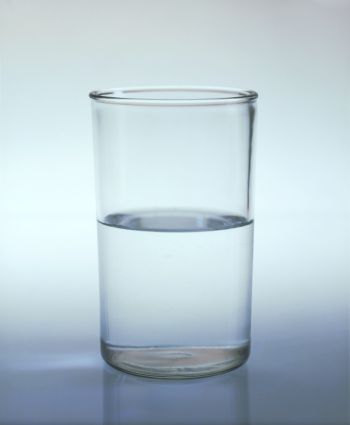 |
| Oy Vey! |
Optimists see: A glass half full. Pessimists see: A glass half empty. Chronic complainers see: A glass that is slightly chipped holding water that isn't cold enough, probably because its tap water when I asked for bottled water and wait, there's a smudge on the rim too, which means the glass wasn't cleaned properly and now I'll probably end up with some kind of virus—why do these things always happen to me?!Dr. Winch could have easily added oy vey to the end of the last sentence.
I have a sizable population of post-menopausal Jewish females in the practice and therefore know some medical Yiddish. Oy vey is definitely a keeper phrase for anyone that has to regularly ask the fateful question: How are you feeling? Oy vey means "woe is me, ouch, or Oh No!" The old Hee-Haw sketch Gloom, Despair and Agony on Me (here) captures the essence of oy vey nicely for those completely unfamiliar with Yiddish idioms.
Oy comes from the Hebrew word 'owy (Strong's H188, oh! woe! or an expression of grief or despair) and vey from the Hebrew word 'abowy (Strong's H17, oh! woe! or an expression of pain). There are many examples of woe in the scriptures, usually in the context of men suffering the consequences of sin. The word oy (translated as woe) is particularly common in the writings of Isaiah and Jeremiah (both prophets are famous for their GD&AOM motifs).
Woe ['owy] is me for my hurt my wound is grievous: but I said, Truly this is a grief, and I must bear it. (Jeremiah 10:19)In his fatherly advice to his son, Solomon* needed both words to describe the consequences of overindulgence in wine, women and food:
Who hath woe ['owy]? who hath sorrow['abowy]? who hath contentions? who hath babbling? who hath wounds without cause? who hath redness of eyes? (Proverbs 23:29)But what about those that seem to find gloom, despair and personal agony at every turn? Oy vey! Dr. Winch continues:
Despite how difficult their constant complaints are for those around them, chronic complainers do not usually see themselves as negative people. Rather they perceive themselves as forever being on the losing end of things, as drawing the short straw on a daily basis. Therefore they see the world as being negative and themselves as merely responding appropriately to the annoying, aggravating or unfortunate circumstances of their lives.His article makes it clear that what complainer really wants is empathy and validation. They need someone to listen without dismissing them or trying to talk them out of their angst. This need will push even the most long-suffering saint to the limits of their patience. But, if we truly aspire to Christian living, then it's something we should be willing to do.
I believe that not only must we attempt to do it, but we can successfully do it. I've found a veritable balm of Gilead for those with a bad case of GD&AOM and oy vey oozing from every pore: "I'm sorry that happened to you. It must have been very difficult". It is amazing how quickly words to this effect can stop the complaining--especially if you are sincere (if not you must at least feign sincerity in a convincing manner). If you don't believe it works, then try it.
In reality, our chronic complaining friends are heavy laden and come looking for empathy, validation and relief. Though we may be helpful, a better source of solace and peace comes form Christ.
Come unto me, all ye that labour and are heavy laden, and I will give you rest. Matthew 11:28
And he will take upon him death, that he may loose the bands of death which bind his people; and he will take upon him their infirmities, that his bowels may be filled with mercy, according to the flesh, that he may know according to the flesh how to succor his people according to their infirmities. Alma 7:12
Ultimately, the extent to which the Savior is reflected in us will determine whether the complainer recognizes Christ as the source of the understanding and love they crave.
______
* some feel that Proverbs 22:17 - 23:34 may be some of the few verses in the Proverbs that were not authored by Solomon but rather by "the Wise Men".
No comments:
Post a Comment